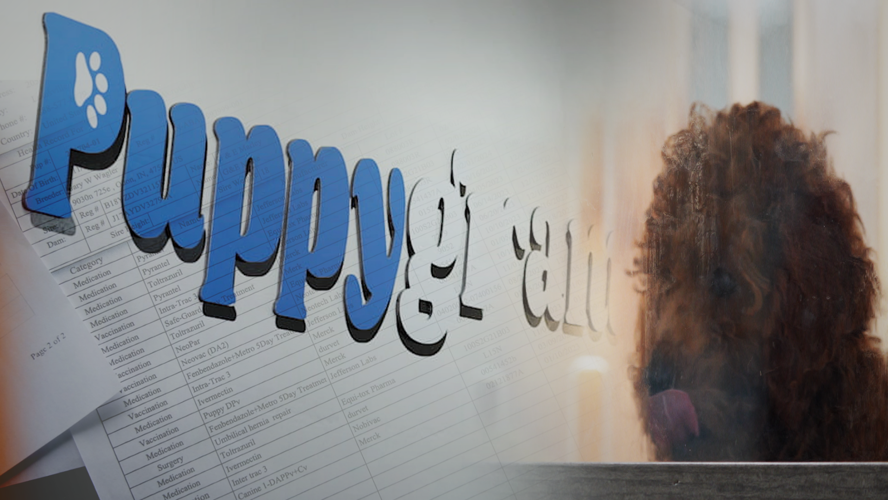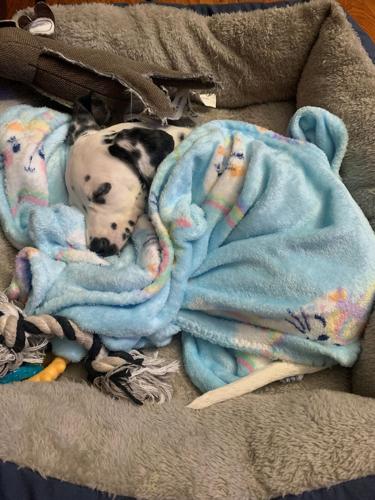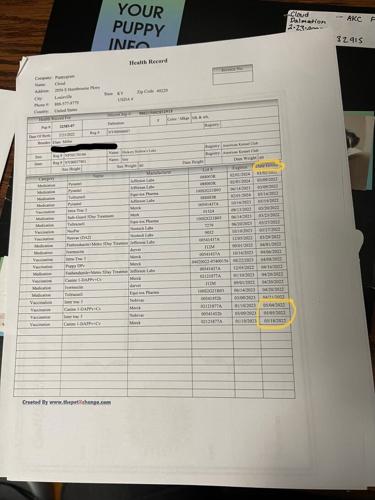LOUISVILLE, Ky. (WDRB) -- More than a year ago, April Gilmore was out shopping with a friend when she stumbled upon Puppygram, a shop on Hurstbourne Parkway that sells purebred puppies and pet supplies.
By the end of the day, Kairi, a Dalmatian, was the newest member of her family.

Kairi in the days after her adoption from Puppygram.
"It was actually complete happenstance," Gilmore said. "Initially, I was excited because I love puppies. Who doesn't?"
Gilmore fell in love with Kairi purchasing her to be a new buddy for her current dog, Kimber.
"She was really timid," Gilmore said of Kairi. "She laid her head in my lap, and I was just like, 'Oh, she's so sweet,,' which is why we ended up picking her. And then I later found out it was because she was sick that she was so timid ..."
The next day, Gilmore said Kairi began to cough.
"Another day or two later, she started having mucus drainage,," Gilmore said. "She was coughing all day, every day. It was sad."
Gilmore said she got Kairi in to see a veterinarian as quick as she could, nine days after she adopted her. Kairi was diagnosed with two conditions that were curable respiratory illnesses. But another, more disturbing diagnosis was made: canine herpes.
It's highly contagious among dogs, Gilmore said, meaning the once-healthy Kimber was also now infected.
"It was very frustrating. I was very angry," Gilmore said. "... We can't take them to dog parks. We can't put them in doggy day care. Kimber was a social dog beforehand."
'At the mercy of the owner'
Karen Jenkins, a regional manager for Puppygram, joined the company after Gilmore bought her dog and can't speak to her experience. But she said she was inspired to work for the company as a happy customer herself.
"It's our biggest goal to make sure when we let a puppy go out our doors that it's in the happiest, healthiest condition possible for the family," Jenkins said. "... My puppies are beautiful and healthy. I've had no troubles with them."
All customers sign a contract when purchasing a dog from Puppygram, part of which states that they must take the dog to a veterinarian within 72 hours.
"They're signing when they take the puppy from here that they took a healthy puppy, to the best of our knowledge," Jenkins said. "We're signing that with them. We do everything while they're in our care to make sure that they're in a very sterile environment."
Beyond being kept inside, Jenkins said all puppies are checked by a veterinarian before being transported from their breeders, and puppies continue to get checked by veterinarians twice a week while at the store.
She added that they can't control what the puppies may be exposed to when they leave.
"Once a puppy leaves our hands here, unfortunately, they're at the mercy of the owner at that time," Jenkins said. "And that is something that they willingly sign for in the contract when they take them."
But Gilmore isn't the only customer claiming their dog from Puppygram quickly got sick. A woman named Chelsea — who didn't want to reveal her last name, — got her dog, Louie, from Puppygram earlier this year.
"I don't want this to happen to another family or anybody else," she said.
Chelsea fell in love with Louie and took out a loan to pay $2,700 for him. She quickly realized something was wrong.

Louie at Puppygram.
"I notice he's not eating that food," she said. "I started to get really worried, because he wasn't even drinking water."
As days passed, Louie started falling over and vomiting. Nine days after the adoption Chelsea took him to an emergency vet, who diagnosed him with a parasite called giardia.
Dr. Lorna Grande, who didn't treat Louie but has 25 years of experience as a veterinarian, said symptoms of the disease typically surface within a week.
"We don't generally see giardia from puppies that come from clean, reputable environments," said Grande, who also serves as the program director of education and outreach for the Humane Society Veterinary Medical Association.
Chelsea said she's confident Louie didn't pick up the parasite at her house.
"My house is clean. My food bowls is clean," she said. "So I knew that that was something he didn't catch from me or from my house. They can also get it from drinking out of puddles of water, but he wouldn't even go outside and use the bathroom. He wouldn't get off the porch. So I knew he didn't catch it from me."
Chelsea had to turn to a non-emergency vet for more affordable care but still had to take out a care credit loan to cover Louie's medical costs.
"(The vet) told me, 'If I'm your only option, I'll be your only option. But I can't promise he's gonna make it out of this,'" she said.
Louie managed to defy the odds.
"He's thriving. He's healthy," Chelsea said. "He's done nothing but get better. He's had no more health issues."
But now, Chelsea is facing a mountain of debt between his adoption fee and all his medical bills.
"I didn't want to let him die, and it was either getting into debt or let him die," she said.
Because Chelsea did not want to be identified, Jenkins couldn't respond to her claims directly.
"I don't know if it's a situation where she actually let us know or is just claiming that she let us know," Jenkins said.
'It isn't what we recommend'
Both Gilmore and Chelsea question the health records they were given by Puppygram. Some vaccination dates listed under "date given" for Kairi are listed in May. She was adopted in April.
Jenkins said the form is a schedule of what would have occurred if the dog stayed with them.
"So even though the dog left in April, it was up to date on all the shots that were listed up to the date that the puppy left the store," she said.
Grande said the sheets of vaccinations and deworming protocols from Puppygram are "unusual" for reputable breeders.

Vaccination paperwork from Puppygram shows dates given, with three May dates listed. Kairi was adopted in April.
"It isn't what we recommend, generally," Grande said. "But it is very common for us to see that from large-scale commercial dog breeders. So, if they're really crowded facilities with lots and lots of animals, they have a tendency to — what we would consider — sort of over-vaccinate."
Todd Blevins, Kentucky state director for the Humane Society of the United States, said in a recent nationwide study, out of 8,000 puppy-buyer complaints, more than 60% involved a sick puppy.
"A lot of these puppies have been over-medicated, over-vaccinated, and so it may take a couple of days for them to show the symptoms," Blevins said. "So, you may see a pet puppy in a pet store window that looks healthy at the time of purchase. And two days later, when you get it home, it's completely sick."
While not specifically speaking to practices at Puppygram, Blevins believes, in general, for-profit pet stores rely on "high-volume breeders" to supply puppies.
"If you think about it, the only way to keep a steady supply of a certain breed in a pet shop window is going to these high-volume breeders," he said.
Jenkins said they have strict guidelines for the breeders they use, which are all USDA certified.
"We would never purposefully breed so that somebody can come back with complaints," Jenkins said. "That just doesn't make good business sense. We don't want puppies coming here that have issues, that are sick, that are not going to be a good fit for families."
Blevins believes USDA certifications don't mean much, believing its enforcement is generally "lax." Though he did not speak to inspections of Puppygram breeders, specifically.
A spokesperson for the USDA Animal and Plant Health Inspection Service, Richard Andre Bell, sent WDRB a statement:
Currently the USDA has 2,866 active class A licensees, according to Bell, meaning animals sold are bred and raised at the licensee's facility. The USDA does not require anyone to be licensed if they have four or fewer breeding female dogs and sell only the puppies born and raised on his or her premises for pets.
Of those licensed, facilities are seen on a risk-based inspection system. Based partially on their inspection histories, facilities meeting the criteria for low-frequency intervals are subject to inspection once every year — or every two to three years — or, in some cases, only when a complaint is received according to the USDA's website. Facilities determined to require high-frequency inspections are subject to inspection as often as every three months.
When asked how many facilities are considered high frequency versus low frequency, Bell said they do not disclose specifics of the risk-based inspection system but added that they rely on "objective criteria to determine if a facility should be inspected at a high-frequency."
Louisville Metro Animal Services has gotten nine complaints about Puppygram since it opened in April 2022, but none of them resulted in violations. The Humane Society of the United States said more than 400 communities nationwide have passed laws to ban the retail sale of dogs and cats, including in Elizabethtown and Radcliff.
"We would hope the Louisville Metro Council would maybe consider the same in light of what's happened with these families and others," Blevins said, adding that these types of ordinances do not stop anyone from purchasing from smaller-scale breeders, just retail sales of dogs in pet stores.
"If a family does want to choose a breeder, we would always advise that they choose a breeder who allows you to meet the dog in person and allows you to meet their parents in person," Blevins said. "There are plenty of breeders out there that are happy to do that."
Puppygram has two other locations: one in Indianapolis and another in Berkley, Michigan.
The Indianapolis City-County Council passed an ordinance earlier this year which bans the retail sale of dogs, cats and rabbits unless they are from an animal services shelter or animal rescue organization. Pet stores have until May 2025 to comply.
Jenkins said her mission is to connect people with their forever pets and she invites people to come and see the shop for themselves.
"We'd like people to come and visit us," she said. "Come in and see. Ask us questions. We're totally transparent about what we do. We wouldn't be here working, doing what we're doing, if we didn't care."
Copyright 2023 WDRB Media. All Rights Reserved.




